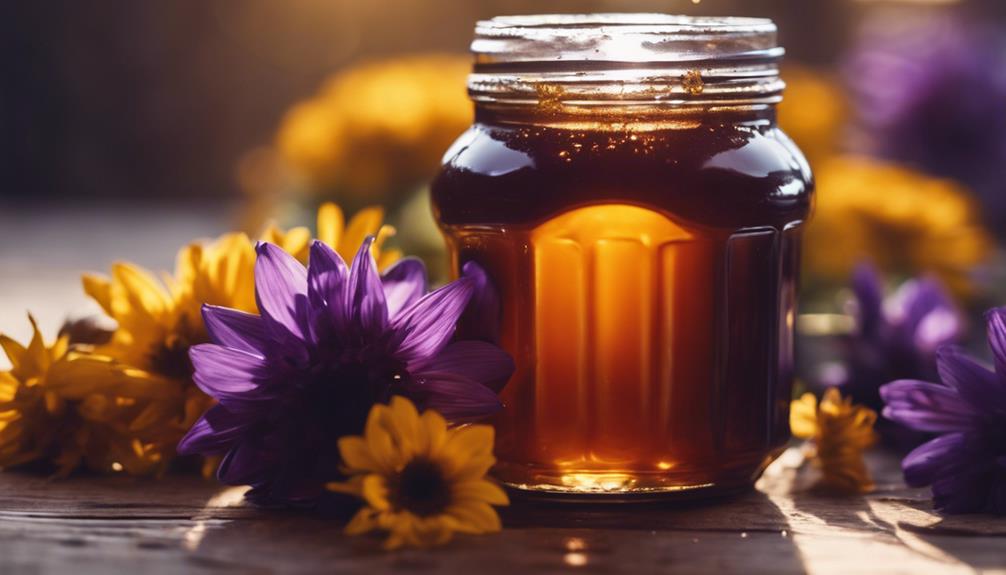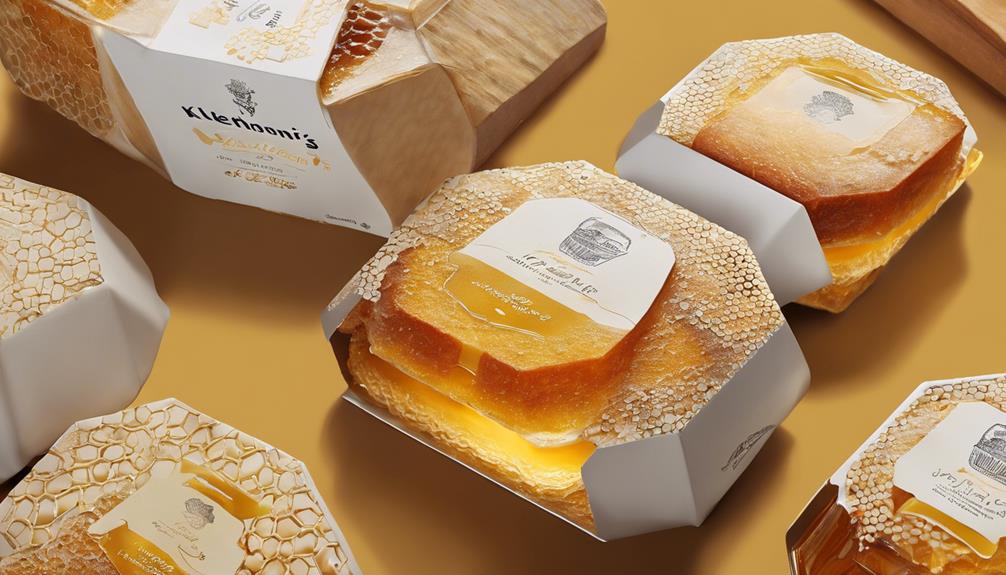Beekeeping can be a rewarding second career, offering a unique blend of passion and purpose. You'll connect with a community of beekeepers who share stories and valuable advice. Start by gathering essential equipment like hives and protective gear; it makes a difference. Effective time management is vital, so create a flexible work plan. Financially, be mindful of initial investments and ongoing costs. Marketing your honey creatively helps it stand out. Plus, educational opportunities abound to enhance your skills. As you explore this journey, you'll discover various paths and insights that could inspire your own beekeeping adventure.
Key Takeaways
- Engage with local beekeeping communities for mentorship and shared learning experiences to enhance your skills and knowledge.
- Establish a flexible yearly work plan to effectively manage time for beekeeping tasks alongside your primary career.
- Invest in essential beekeeping equipment like hives, protective gear, and honey extractors to ensure efficient operations.
- Develop strong marketing strategies for your honey products to differentiate and attract customers in a competitive market.
- Consider additional income sources, such as selling beeswax and offering workshops, to diversify your beekeeping revenue.
Personal Journey in Beekeeping
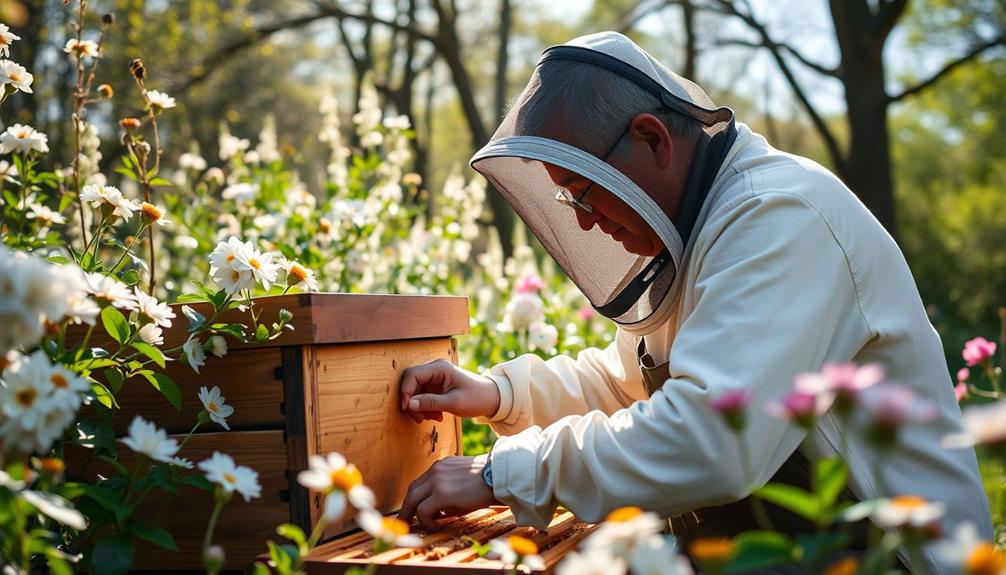
When you commence your beekeeping journey, it often starts with a simple spark of curiosity, just like mine did after taking a children's course with Mette and Sven Petersen. This initial exposure ignited a passion that's fueled my beekeeping endeavors for over seven years.
Engaging with communities, similar to the partnerships formed with Native cultures, can enhance your experience and provide valuable insights into sustainable practices. You'll face challenges along the way, such as successfully raising a new queen after your colony loses its. This experience not only teaches you adaptability but also sharpens your problem-solving skills.
As you gain hands-on experience, observing bees at the hive entrance will deepen your understanding of their behavior and activities. A pivotal moment for you might be receiving a bee colony from a local beekeeper like Olaf of Auenland Beekeepers, marking your change from mere interest to active participation in beekeeping.
Each interaction and observation will enhance your confidence and skills. Traveling and learning from global beekeepers will further enrich your knowledge. You'll discover various practices, which you can adapt to your own beekeeping.
It's a continuous learning process that helps you grow, both personally and as a beekeeper. Embrace these experiences—they shape your unique journey in this fascinating world.
Essential Beekeeping Equipment

After you've developed your skills and gained confidence in beekeeping, it's time to focus on the equipment that will support your journey. First, you'll need a hive, typically made of wood or plastic, which serves as a home for your bees. Confirm it can accommodate different frame sizes for honey production.
If you're interested in reducing waste while maintaining your hives, consider incorporating easy composting practices to recycle organic materials into natural fertilizers for your garden.
Protective gear is essential. A beekeeper suit, gloves, and a veil will safeguard you against bee stings while you work with your colonies.
Next, consider investing in a honey extractor, either manual or electric, to efficiently remove honey from the comb without damaging it. Stainless steel models are recommended for durability and hygiene.
You'll also want essential tools like a hive tool and a smoker. The hive tool helps you pry apart frames and boxes, while the smoker calms your bees during inspections.
Regularly used equipment includes feeders for supplementing your bees' diets and a bee brush for gently moving bees away from honeycomb during harvesting.
With the right equipment, you'll enhance your beekeeping experience and guarantee your bees thrive.
Time Management Strategies

Managing your time effectively in beekeeping is vital for balancing your responsibilities.
To enhance your financial planning, consider setting specific savings goals that align with your beekeeping ventures.
Start by prioritizing essential tasks, creating a flexible schedule, and considering delegation or outsourcing where possible.
These strategies can help you stay organized and reduce the stress of your growing workload.
Prioritize Essential Tasks
Effective time management is essential for successful beekeeping, especially when balancing it as a second career. Start by establishing a yearly work plan to identify your time reserves and allocate specific periods for essential beekeeping tasks. This approach helps you integrate personal and family commitments while guaranteeing you don't overlook critical activities.
Next, estimate the time required for various tasks, especially during peak workload periods like swarm control and honey processing. Recognizing these busy times allows you to work more efficiently and reduces stress.
If you plan to shift from part-time to full-time beekeeping, be prepared for a schedule adjustment that may require 60-70 hours of work weekly. Consider seeking assistance from experienced beekeepers to ease this change.
Prioritize quick bulk processing of honey to address any infrastructure limitations and secure efficient harvests. Additionally, think about outsourcing non-essential tasks to save time and resources.
Create a Flexible Schedule
Creating a flexible schedule is essential for managing your beekeeping tasks alongside other commitments. Start by establishing a yearly work plan that outlines seasonal tasks, helping you identify time reserves and prioritize responsibilities. This approach lets you see what needs to be done throughout the year, making it easier to balance beekeeping with your other duties.
Allocate dedicated time blocks each week for essential activities like hive inspections and honey extraction. By doing this, you'll guarantee consistency and avoid last-minute rushes during busy periods.
Consider leveraging automation and technology for tasks such as hive monitoring and data collection; this can save you time and enhance efficiency when managing multiple colonies.
Be prepared to adjust your schedule based on the natural rhythms of bee activity and seasonal changes. Flexibility is key when addressing urgent needs like swarm control or pest management.
Additionally, don't hesitate to seek assistance from experienced beekeepers or hire seasonal help during high workload times, such as honey harvest. This support can alleviate stress, allowing you to maintain a balanced personal life while pursuing your beekeeping passion.
Delegate and Outsource Activities
Balancing beekeeping with other responsibilities can be challenging, but delegating and outsourcing activities can lighten your load greatly. By handing over tasks like honey extraction and hive inspections to experienced beekeepers or hired help, especially during peak seasons, you can markedly reduce your workload.
This allows you to focus on what truly matters—growing your business and guaranteeing the health of your hives.
Outsourcing honey bottling and labeling processes can streamline your operations, freeing up time for you to concentrate on hive management and sales strategies.
Don't hesitate to tap into local community networks to find individuals willing to assist with beekeeping tasks. This not only fosters collaboration but also mitigates the burden on you.
Additionally, implementing technology solutions like hive monitoring systems can provide real-time data, reducing the need for frequent physical inspections. This saves both time and resources.
Financial Considerations
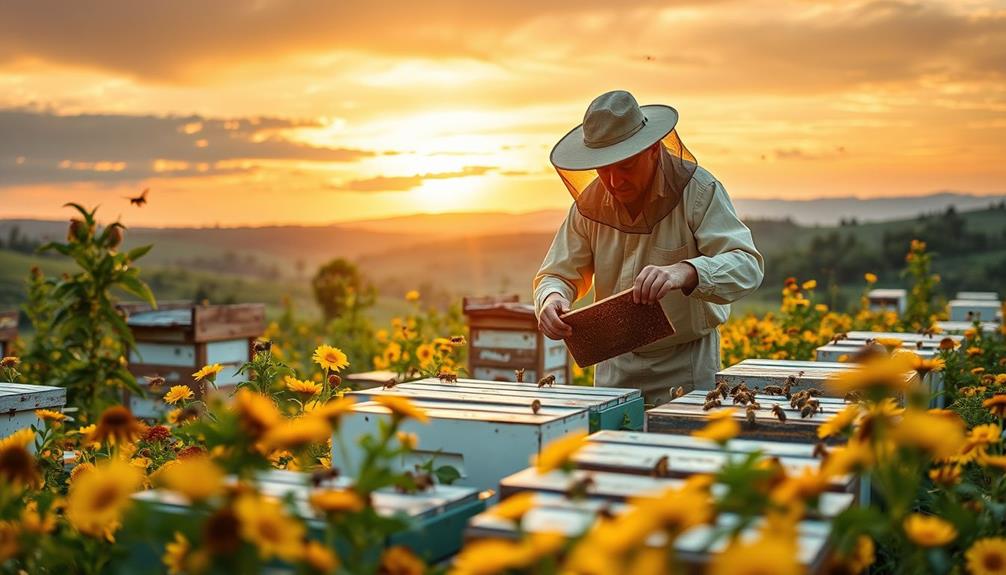
Beekeeping's financial landscape can be intricate, so it's essential to approach your second career with a solid financial plan. Shifting into beekeeping involves initial investments in equipment and infrastructure, which can range from €2,000 to €10,000 based on the scale and quality you choose.
You'll also need to keep an eye on ongoing operational costs, such as maintenance, hive management, and supplies, averaging €150 to €300 per colony each year.
Establishing a clear pricing strategy for your honey sales is vital; retail prices typically fall between €5 and €15 per jar, influenced by your local market and honey quality.
To avoid complications while scaling your operation, conduct a thorough inventory of your personal and inherited assets to assess available resources.
Don't forget to explore income sources beyond just honey production. Selling beeswax, propolis, or even offering beekeeping workshops and tours can enhance your financial sustainability.
Marketing Your Honey
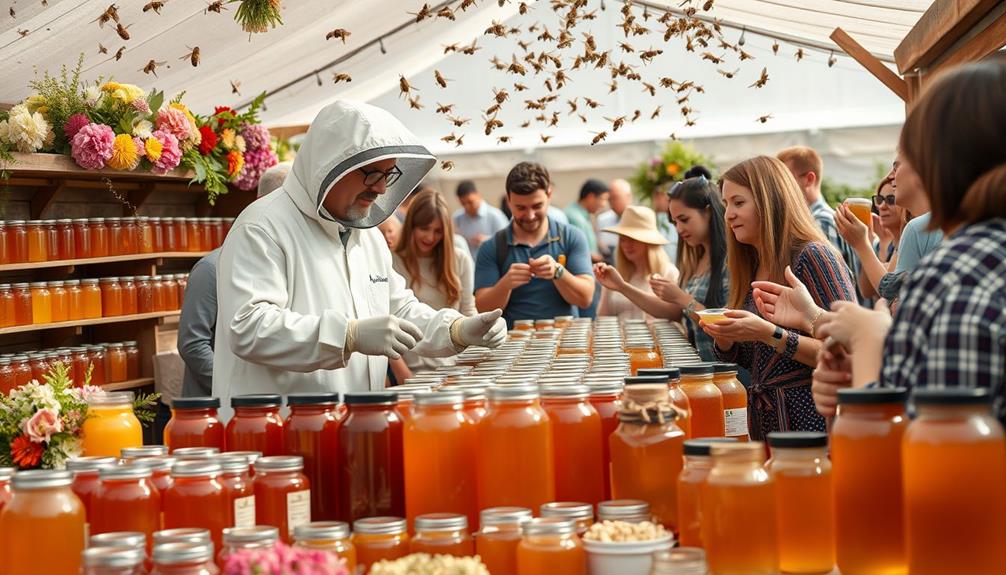
When it comes to marketing your honey, establishing a strong brand identity can make all the difference. You want your products to stand out in a competitive market, so focus on unique packaging and labeling that reflects the quality of your honey.
Here are four strategies to enhance your marketing efforts:
- Utilize Multiple Sales Channels: Sell at local farmers' markets, set up an online store, and partner with local shops to reach a wider audience.
- Implement Effective Marketing Strategies: Use social media to promote your honey and engage with your community. Share recipes, beekeeping insights, and customer testimonials to create awareness.
- Consider Pricing Strategies: Guarantee your prices reflect the quality of your honey while remaining competitive. Cover your costs and aim for a reasonable profit margin.
- Participate in Local Events: Join fairs and local events to showcase your honey. This direct interaction allows you to gather feedback and connect personally with potential customers.
Community and Networking
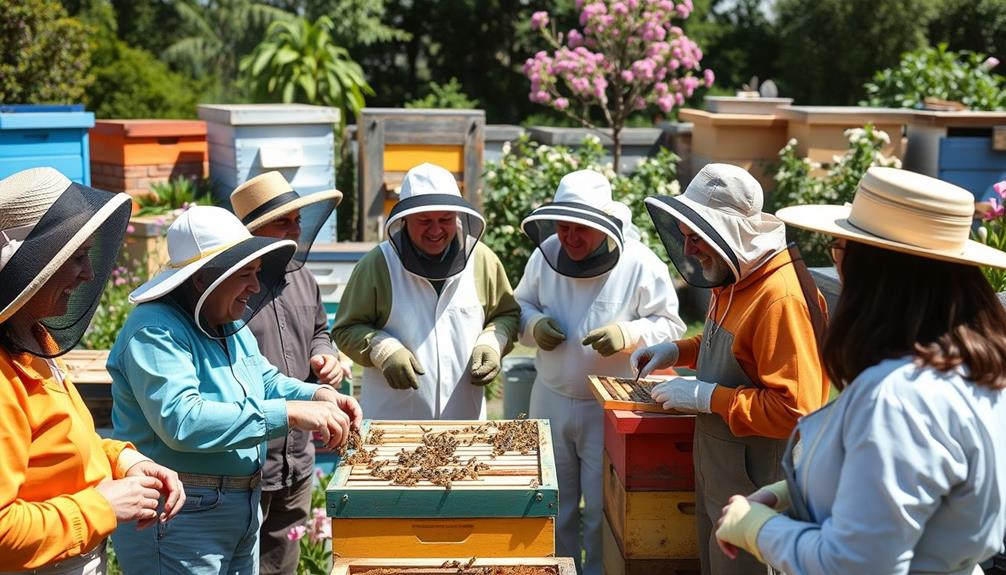
Building a successful beekeeping venture isn't just about producing honey; it also involves creating a supportive network. Connecting with fellow beekeepers allows you to exchange knowledge, resources, and experiences, fostering mutual support and collaboration.
By networking with seasoned beekeepers, you can gain invaluable insights that help you avoid common beginner mistakes, enhancing your success in this rewarding field.
Engaging in local beekeeping associations or clubs can facilitate connections that benefit your growth. These groups often provide access to workshops that enhance your skills and deepen your involvement in the community.
Additionally, online platforms and forums are fantastic resources for sharing experiences, seeking advice, and staying updated on industry trends and challenges.
Don't underestimate the value of participating in educational initiatives, like community courses. These opportunities can spark interest in beekeeping and help you establish a network of aspiring beekeepers who share your passion.
By building these connections, you'll not only enhance your beekeeping knowledge but also create a support system that can sustain you throughout your journey.
Common Challenges and Solutions
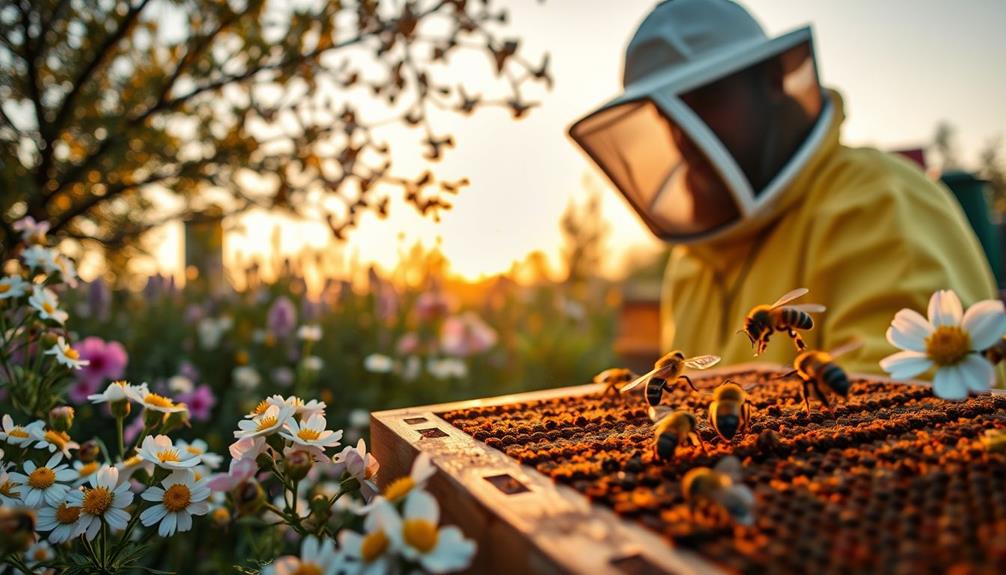
Starting a beekeeping venture can be exciting, but it also comes with its fair share of challenges. As you immerse yourself in this rewarding career, you'll likely face several common obstacles. Here are some solutions to help you navigate them:
1. Scaling Up: Rapid growth in bee colonies can lead to unexpected costs.
Plan carefully before expanding from a few to multiple colonies to manage expenses and operations effectively.
2. Time Management: During peak seasons, tasks like swarm control and honey processing can become overwhelming.
Prioritize your tasks and set a schedule to avoid burnout and maintain a balanced lifestyle.
3. Outsourcing: If honey extraction and processing are eating up your time, consider outsourcing these tasks.
This'll allow you to focus on essential activities and increase your overall efficiency.
4. Pest Management: Regularly monitor your colonies for pests, especially Varroa mites.
Implement timely treatments to guarantee colony health and prevent significant losses.
Building a supportive community with experienced beekeepers can also provide valuable insights and help you navigate these challenges more smoothly.
Embrace these tips, and you'll be well on your way to a successful beekeeping journey!
Educational Opportunities

If you're looking to start your beekeeping journey, hands-on learning experiences can make a world of difference.
Many programs offer practical training, allowing you to gain real-world skills while working with bees.
Plus, online resources provide flexible options to learn at your own pace, ensuring you have the knowledge you need to succeed.
Hands-on Learning Experiences
Hands-on learning experiences in beekeeping can be incredibly enriching, especially for those new to the field. Engaging directly with bees and hives not only enhances your understanding but also sparks a passion for this rewarding endeavor.
Here are some ways you can immerse yourself in hands-on learning:
- Enroll in Local Courses: Many beekeeping schools, like those in Segeberg, offer free courses for youth under 18. These programs foster early interest in beekeeping through practical experiences.
- Join Community Projects: Initiatives like the Sommerbiene project encourage community involvement, allowing you to engage directly with bees and learn essential skills.
- Participate in School Programs: Successful beekeeping courses at elementary schools show how effective practical involvement can be in teaching children about bee biology and the crucial role of pollinators.
- Get Involved in Workshops: These workshops cover various aspects of beekeeping, from hive management to honey extraction techniques, providing thorough knowledge through hands-on practice.
Online Training Resources
With the rise of online training resources, aspiring beekeepers can easily engage themselves in the world of beekeeping from the comfort of their own homes. Platforms like the BeeHappy Mission offer immediate access to thorough knowledge and practical experience in various aspects of beekeeping.
You can explore a wealth of information tailored to beginners and hobbyists, thanks to websites like Imkerei-Mrowka.de, which foster community and insight sharing.
Many online platforms provide downloadable guides and instructional videos, enhancing your learning experience as you start your beekeeping journey. These resources allow you to learn at your own pace, making it easier to fit your education into a busy schedule.
Participating in virtual courses and webinars can greatly expand your understanding of beekeeping practices and techniques. These educational initiatives often include community forums, where you can seek support, share experiences, and learn from seasoned professionals in the field.
Embracing these online resources can be a game-changer, helping you build a strong foundation in beekeeping while balancing your other career commitments.
Inspiring Success Stories
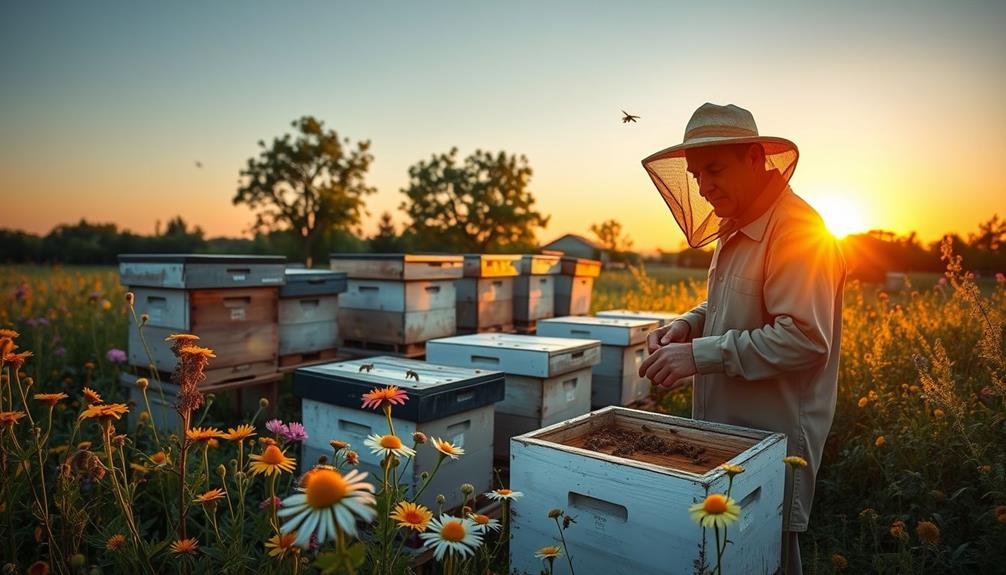
Beekeeping's allure has drawn many individuals from various professions, turning their passions into thriving businesses.
Take Amy Newsome, for example. She shifted from fashion photography to gardening and beekeeping, demonstrating how diverse skills can pave the way for success.
Educational programs, like the beekeeping school in Segeberg, play an important role in inspiring people across generations to explore beekeeping as a second career.
Here are four inspiring factors that contribute to these success stories:
- Global Insights: Participants in beekeeping programs in Australia and New Zealand gain invaluable knowledge that enhances their practices.
- Mentorship Opportunities: Networking with seasoned beekeepers and joining local associations provides essential support and guidance.
- Accessible Resources: Online courses, such as those offered by the BeeHappy Mission, make it easier for aspiring beekeepers to acquire necessary skills.
- Community Engagement: Joining beekeeping groups fosters collaboration and learning, helping you navigate the challenges of your new career.
These elements not only inspire but also equip you to make a successful shift into the world of beekeeping.
Frequently Asked Questions
How Many Beehives Does One Need to Make a Living?
To make a living from beekeeping, you'll need at least 50 to 100 beehives. This number helps guarantee a sustainable honey production, enabling you to generate a decent income while managing costs effectively.
How Much Does a Beekeeper Earn per Month?
As a beekeeper, your monthly earnings can range between €1,000 and €3,000, depending on your operation's scale and market demand. With 50 colonies, you might exceed €5,000 during peak honey harvest months.
What Were Beekeepers Called in the Past?
In the past, beekeepers were often called "Ziedler" in medieval Germany, highlighting their role as honey gatherers. Ancient Egyptians considered them essential figures, while the term "apiculturist" evolved later to reflect the profession's growth.
How Demanding Is It to Be a Hobby Beekeeper?
Imagine the hum of bees as you plunge into beekeeping. It can be demanding, requiring 5-10 hours weekly for inspections and maintenance, but the connection with nature and the sweet rewards make it worth it.
Conclusion
Beekeeping can transform your weekends into a buzzing adventure, turning stress into sweet success. While juggling your day job, you might find joy in watching your hives thrive, creating a balance between work and passion. Just as bees dance from flower to flower, you can navigate through challenges, finding community and support along the way. So, whether you're dreaming of a honey harvest or simply seeking a new hobby, remember: it's never too late to let your dreams take flight.



